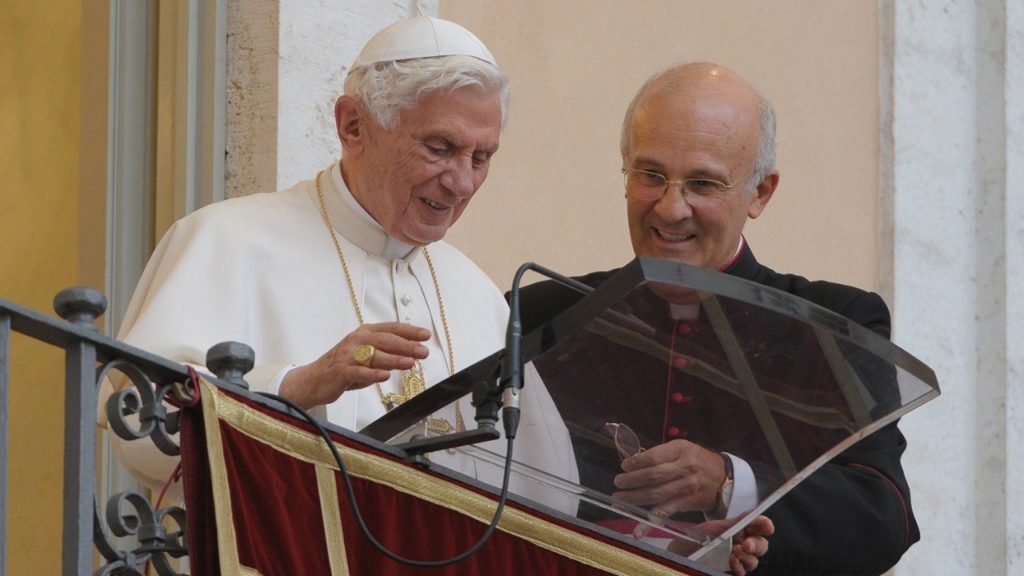In the fall of 2022, I had dinner with Archbishop Alfred Xuereb, then-apostolic nuncio for Korea and Mongolia. Along with Msgr. Georg Gänswein, Xuereb is arguably the person who lived in closest proximity with Pope Benedict XVI, whom he served as second personal secretary from 2007 to the pontiff’s resignation.
Over dinner, Xuereb, who was born in Malta, shared anecdotes from his days with the former pope. I urged him to let me publish some of these stories, but he politely declined, adding that one day he might write a book.
That book has now been published. “My Days with Benedict XVI” (Sophia Institute, $25) is a fine book. There is no gossip in here, no shocking revelation, no behind-the-scenes secret.
Unlike what is advertised on the book’s back cover, readers will not learn “why Benedict really abdicated the chair of Peter.” What makes this book worth reading is the many anecdotes on Benedict’s everyday life, which shed light on his personality as well as how he lived his faith.
For one, this book dismantles the caricature of the strict authoritarian, the cold “German” depicted, for instance, in the 2019 film “The Two Popes.” Benedict was “a man full of tenderness,” as Xuereb puts it, whose attitude toward his collaborators was fatherly in the most literal sense of the word.
On his first Christmas in the pontifical apartments, Benedict told Xuereb that according to Bavarian custom, on Christmas Eve, the head of the household reads some excerpts from the Gospels to the rest of the family, then intones some Christmas carols. The pope did just that, reading from the Gospels of Luke, then leading the pontifical family in the singing of carols.
Benedict did not like sports. In the book, he reveals to an incredulous Xuereb, who was impressed when he saw the pontiff kick a pinecone, that he has not played soccer once in his life. Yet the pope knew that Xuereb was a Juventus fan, and kept up to date on soccer results to make him happy.
One day, in the aftermath of an important game, the pope asked Xuereb with some hesitation whether Juventus had lost. They had tied, in fact. “So are you happy?” the pope asked. “Certainly,” said Xuereb, “I thought the Holy Father might have watched the game.” “You have a very active imagination!” Benedict replied.
The second valuable aspect of this book is how it ties up the pope’s public pronunciations with his daily life. The book contains a fair amount of quotes from the pope’s public speeches, but it shows us Benedict lived what he preached.
In a famous passage from his “City of God,” St. Augustine wrote: “Two loves built two cities: the love of self, even to the contempt of God, built the earthly city; the love of God, even to the contempt of self, built the heavenly one.”
A lifelong student of Augustine, Benedict offered this testimony in the events of his everyday life.
For instance, Xuereb recalled the day Benedict gave a catechesis on St. Ambrose. He intuited then that Benedict holds Ambrose as a model. In that catechesis, Benedict remarked that both for Ambrose and Augustine catechesis is inseparable from the witness of life, and that Augustine was not converted by Ambrose’s spending homilies, but by the testimony of the bishop’s life.
Later on a November day the pope woke up with a cold. When Xuereb asked him if he also had a headache, the pontiff replied simply, “That never goes away.” Benedict had never mentioned this before to Xuereb, who was shocked to realize that the pope was constantly in pain. Yet he carried out all his tasks and never let those around him know about it.
Several passages from Benedict’s public speeches included in the book deal with the importance of looking at reality with the eyes of faith. As Benedict stated in his last public appearance on February 27, 2013: “God guides his Church, he sustains it always, especially at times of difficulty. Let us not lose this vision of faith. … In our hearts may there always abide the joyful certainty that the Lord is at our side.”
Benedict saw the presence of God at his side in seemingly small signs, for he looked at every aspect of reality with the eyes of faith. Xuereb recounted that one day, at lunch, the pope expressed his joy about his recent visit to the U.S., where he felt that Divine Providence had helped him at every step.
And he recalled that when he visited the concentration camp of Auschwitz, a rainbow appeared in the sky behind him just as he pronounced his speech. “Even that was a sign of Providence,” the pope added.
The most controversial page in Benedict’s history, his resignation, can be read in light of his desire to build the city of God.
Xuereb remembered the events well. The pope invited him to his office; he was calm, like somebody who has gone through a great internal travail but is now at peace. Xuereb wanted to tell him to at least think about it longer. But he remained silent, only assuring the pope of his prayers.
Later, he remembered something he had observed in the days leading up to Benedict’s resignation.
The pope was accustomed to start Mass in his private chapel at the toll of St. Damasus’ bells. Lately, however, Benedict would linger for some time in the sacristy after the bell. Xuereb understood that he was praying for something crucial, some important decision he needed to make. Now he knew what that was.
As becomes clear in his secretary’s intimate recollections, the 265th pontiff stepped down, convinced that he was serving God’s will; he did it not out of fear, but out of love for God, even to the contempt of self.

